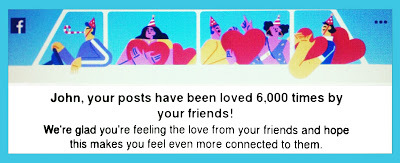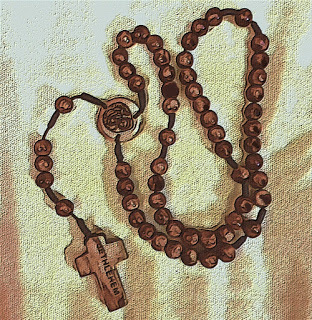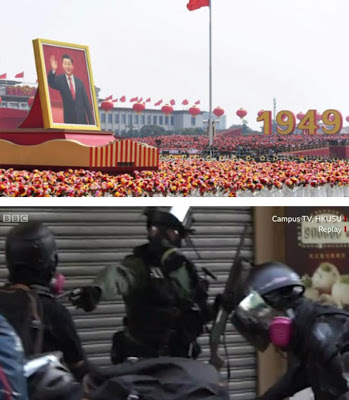John Janaro's Blog, page 142
October 16, 2019
Dabblings in Digital Art
Published on October 16, 2019 13:30
October 13, 2019
Finally, Newman is a SAINT
 "God knows what is my greatest happiness, but I do not.
"God knows what is my greatest happiness, but I do not. "There is no rule about what is happy and good; what suits one would not suit another. And the ways by which perfection is reached vary very much; the medicines necessary for our souls are very different from each other.
"Thus God leads us by strange ways; we know He wills our happiness, but we neither know what our happiness is, nor the way. We are blind; left to ourselves we should take the wrong way; we must leave it to Him."
~Saint John Henry Newman
Published on October 13, 2019 11:46
October 12, 2019
Does the World of "Social Media" Make Us More Lonely?
 Ah, social media! Everybody wants to beat up on social media.
Ah, social media! Everybody wants to beat up on social media.This is not without reason. First of all, in 2019 we need to recognize the tag "social media" as a shorthand term for the entire "new media" explosion of this decade, the whole scope and variety of mobile audiovisual access that seems to allow every individual the possibility of turning their life into a reality TV show.
In our daily lives we are immersed, far more than we realize, in a communications media environment that did not exist fifteen years ago. This is a fact worthy of reflection.
Anxious questions often arise. Is the phenomenon of social media destroying our psychological health? Is it taking us away from "real" human interaction and cheapening communication? Is it turning us into reactive, antagonistic, illogical, irresponsible, and damaged people?
It must be, surely... right? "Social media is the scourge of our society" — I read or hear statements like this all the time... on social media!
The Internet has certainly displayed, facilitated, and exacerbated our dysfunctional patterns of engaging with one another. People too easily post or comment or tweet without adequate thought or sensitivity. These kinds of media are open to abuse because of their speed, dislocation, and variability. They are also used to raise the levels of expectations, complexity, and stress in our society.
To put it in more concise terms, we've got a real mess on our hands.
I do think it’s interesting that almost everyone seems to agree that “social media is the problem” — which to me is an almost certain indication that it is not THE problem.
The realm of social media is crazy like everything else in our society, but it’s also a forum where people desperately try to “connect” from out of their isolated spaces. Of course, it’s generally too facile and superficial and involves too little personal risk to really build connections (though it’s not impossible, and I have seen remarkable uses of it).
The Internet today is the gathering place, the hangout spot, the public square of "the global village" (and McLuhan's paradoxical term continues to express the inherent tensions of an environment that aspires to such a vast intimacy). It's a bit uncanny, this global village square, where our attention and agency can operate in multiple exchanges involving multiple locations, all of which are physically very distant from the place in which we are bodily located at any particular time. Indeed, the “virtual commons” — in itself — requires no actual investment in any particular "feet-on-the-ground" common life, no commitments to “elbow to elbow” relationships.
People come from everywhere to social media in search of human connection, “present themselves” (by constructing their image) and seek applause or affirmation or just to know that they are not alone. This can be very helpful, as far as it goes. There was a marketing slogan about an "old media" platform that connected people over great distances (and still does) in a more private way, the telephone. Regarding the phone call, the slogan said: "It's the next best thing to being there." Something analogous could be said about new media. Interpersonal and even communal exchanges are possible in ways we scarcely could imagine when I was young. But it still remains "the next best thing" to a whole experience of being with others. As a substitute, it inevitably proves to be frustrating and disappointing.
Here we are today, feeling more isolated, more alone, more "depressed," more shallow, and more bellicose than ever. Social media gets blamed, but the problem is much deeper, I think. The problem is perhaps that we have no real “commons.” We have few places where we are wholly invested in being together -— places of unmediated “belonging-with-others,” where relationships can grow on a human scale.
It’s a problem, in part, of the great human crisis of this “new epoch” (what Guardini calls the “epoch of power”). I'm in the process of developing a more general survey of this emerging epoch in human history. Here let me note that this terminology must not be taken to indicate unambiguous progress for humanity, much less any kind of evolutionary trans-humanism. Human nature doesn't change through the historical process, but the knowledge and agency of human beings grow through time. This growth is not linear, but it tends overall to accumulate. What we discover about the world and our own humanity, however, can never replace the basic challenge of living, which is a task for freedom. The perennial responsibility to choose the good will always entail the risk of resistance against the good. In the "field" of human history, the wheat and the weeds both grow together.
To return to the immediate subject at hand: an important feature of our shifting into the new epoch is the ongoing technological revolution. Technology has affected our way of inhabiting space and time, and this has jolted the bases for human relationships in ways that we still haven't adequately considered. Our technological power has vastly expanded our "mobility" (among other things), allowing for many new opportunities but also dislodging what had always been the grounding of the human communal experience, the natural network of human relationships that were “given” by the inescapable fact of being “stuck” in a place (village, neighborhood, town, etc).
 People rarely consider how much their humanity is extended (and stretched, stressed, dislocated) by the entire infrastructure of technological power we live in, which is so pervasive we don’t even notice it. We live in an environment that puts powerful tools in our hands to “manage” life and relationships. This opens fascinating possibilities but also gives rise to the tendency to try to “escape from ‘the given’” whenever it conflicts with our comfort or desires, or imposes obligations (especially interpersonal ones).
People rarely consider how much their humanity is extended (and stretched, stressed, dislocated) by the entire infrastructure of technological power we live in, which is so pervasive we don’t even notice it. We live in an environment that puts powerful tools in our hands to “manage” life and relationships. This opens fascinating possibilities but also gives rise to the tendency to try to “escape from ‘the given’” whenever it conflicts with our comfort or desires, or imposes obligations (especially interpersonal ones).It can be enriching to get away from the local village and its limited perspectives, and choose a place (or places) to live where we can grow as persons. But there is the corresponding danger that we will use our mobility to distance ourselves from the responsibilities that come with stability and commitment, and search for places to hide and stagnate. We can end up isolating ourselves in our chosen places, with whatever technological distractions we choose to provide for ourselves. Not surprisingly, rootlessness, superficial social relations, and relentless distraction prevent many people from making progress in personal maturity.
This is the “problem” that I think we need to consider. I’m not saying, “everybody should go back to the village” — this is not a realistic possibility even if it were desirable. There is much good in having possibilities to move about: thus we can travel, expand our horizons, appreciate different cultures, engage in collaboration on a global scale, and also go off (again, even far away) to specially protected nature parks when we want to “get away from it all.”
There is significant value in the unprecedented availability of all these options for human experience. Nevertheless humans are made for connection and commitment in real relationships. And since we are no longer “thrown together” in the village with literal neighbors, we are challenged to live more intentionally, more consciously aware of this constitutive human need. Multiplication of casual encounters governed by one’s own whims (powered by all this enormous technological enhancement) does not meet this need. People who "play around with" the need for human connection by using social media while trying to evade the work involved in committed relationships will eventually experience distaste, frustration, and greater alienation.
One key is to recognize and commit to the relationships that are (still) “given to us” (God is good, and He provides for human beings in every era, especially when they allow their essential needs to become prayer — to open themselves to relationship with Him). There are persons who are given to us, who are meant to be basic companions for all of our lives. Family is, or should be, the obvious example.
But here again we meet the problem of the absence of connection. Our power over material reality — combined with the pressure of extended expectations, impatience, and the desire to dominate and radically control reality — have led to the technological and sociopolitical manipulation of the family’s natural constitution and fruitfulness. While often celebrated as a new achievement for "freedom," this has already proven to be an enormous human catastrophe, painfully evident wherever the ice of "demographic winter" has taken hold. Sooner or later we will have to face it: turning sexual relations into a game (with the help of many varieties of technological power) has dissipated the energies that build and sustain family bonds.
 What value is there to progress and development if they cannot be passed on to future generations? The history of persons, communities, peoples, nations, and humanity itself depends on the vitality of family life as a gift from God "written" profoundly into our human nature. In our legitimate concern for the earth's environment, we must not forget the imminent dangers that we face because of the wanton pillaging and destruction of this immensely delicate “human ecosystem,” the organically generated human structures that constitute and sustain the most fundamental human relationships.
What value is there to progress and development if they cannot be passed on to future generations? The history of persons, communities, peoples, nations, and humanity itself depends on the vitality of family life as a gift from God "written" profoundly into our human nature. In our legitimate concern for the earth's environment, we must not forget the imminent dangers that we face because of the wanton pillaging and destruction of this immensely delicate “human ecosystem,” the organically generated human structures that constitute and sustain the most fundamental human relationships.The family remains an ineradicable source and sign of the human vocation to love and to be loved. But also I think we are entrusted to one another in various ways, by the interpersoal gifts that arise from encounters within the circumstances of life. These may even generate organic forms of community, but it is always important to discern and commit oneself to friendships that can constitute a “vocational companionship” — friends who really help and accompany us in the journey of life.
Social media platforms may be able to play a role in facilitating and fostering interpersonal relationships, and in reaching out to others. In themselves, they are another form of technological power which must be integrated into a more profound sense of being human persons called to a communion of love.
Published on October 12, 2019 10:30
October 10, 2019
Christina Grimmie: A Daughter of God

It has been three years and four months since this wonderful human being passed beyond the limits of this present world. On June 10, 2016 Christina Grimmie, a daughter of God, was called home to her Father's house.
She wants us to remember that His house is our home too.
Published on October 10, 2019 20:11
October 9, 2019
Getting Close Up With the CAPITALS
 On the evening of October 8, we went to a Capitals game and had the best seats we've ever had. John Paul was able to get four free seats from some of his connections, right at center ice, behind the penalty box.
On the evening of October 8, we went to a Capitals game and had the best seats we've ever had. John Paul was able to get four free seats from some of his connections, right at center ice, behind the penalty box.So Eileen and I went with John Paul and his fiancée Emily. We had a great time. The Capitals played the Dallas Stars in a game with some exciting moments. The highlight was when the Caps scored with less than a minute left in regulation, to tie the score and force the game into overtime. The crowd's roar was deafening.
Unfortunately, they lost in overtime. But they still got one point for a "regulation tie" according to the way the NHL calculates records (2 points for a win, 1 for a tie at the end of regulation that the team loses in overtime, and 0 for a loss).
It was fun. The hockey season has begun again, and it has been more than a year since the Capitals won the Stanley Cup and finally gave my son a hometown champion after a whole childhood of loyal and but often frustrating cheering for Washington D.C. teams.


Here we all are, in the fourth row!
Needless to say, baseball isn't over yet, and the 2019 Washington Nationals are still in the running... ⚾
Published on October 09, 2019 15:20
October 7, 2019
The Rosary: "Handing Over Our Burdens"
 Today is the beautiful feast of Our Lady of the Rosary.
Today is the beautiful feast of Our Lady of the Rosary.Saint John Paul II has inspired many people (including our present Pope Francis) to a deeper devotion to the prayer of the Rosary. Here are a few words of that great Pope from the beginning of this new millennium, from his Apostolic Letter on the Rosary in 2002:
"Following in the path of Christ, in whom man's path is 'recapitulated,' revealed and redeemed, believers come face to face with the image of the true man... It could be said that each mystery of theRosary, carefully meditated, sheds light on the mystery of man.
"At the same time, it becomes natural to bring to this encounter with the sacred humanity of the Redeemer all the problems, anxieties, labours and endeavours which go to make up our lives. 'Cast your burden on the Lord and he will sustain you' (Psalm 55:23). To pray the Rosary is to hand over our burdens to the merciful hearts of Christ and his Mother... The Rosary does indeed 'mark the rhythm of human life,' bringing it into harmony with the 'rhythm' of God's own life, in the joyful communion of the Holy Trinity, our life's destiny and deepest longing" (Rosarium Virginis Mariae 25).
Published on October 07, 2019 20:25
October 5, 2019
It Really IS "Okay"...
 "It's OK not to be OK."
"It's OK not to be OK."I certainly know this is true. It can be hard for the younger generation to really accept this, even if they affirm it verbally. After all, the future still stretches before them, as yet undefined. And this is an era in which empirical scientific knowledge and technological power are continually generating new "life hacks" that overcome limits of all kinds.
We expect solutions. But still, even today, not everything can be fixed.
There is no shame in patching things up as best we can, and going with what we have. It can even be surprisingly creative, when we do what we can to build on the foundation that every human person's life has meaning and purpose, and every human person is loved by God.
I'm "not OK." I don't want to complain, but I have had a few persistent problems, so I'm aware that life can be hard, and I would like to think that through many years I have learned a little about empathy.
As I have explained in some detail on this blog, in other writings, and in what still remains my most recently published book (in 2010), I have struggled with long-standing illnesses most of my life. An avid outdoorsman in my youth, I probably first contracted Lyme disease in my early 20s (which is when I first experienced some of its now well-known early symptoms). Unfortunately, doctors in Northern Virginia in 1988 knew very little about this strange tick-borne illness that had only recently begun to afflict New Englanders but was in fact spreading throughout northeastern USA and elsewhere. It was some two decades before my illness was identified and targeted directly with antibiotics and several years of diverse treatments and therapies. Some measure of success was achieved at great cost, but at a very late stage. Frankly, I'm glad to be alive, but I still have to deal with the wide spectrum of elusive and often debilitating consequences of a Lyme infection that was neglected for so long.
Day by day, we patch things up as best as we can. We go with what we have.
Long before Lyme disease came along, I had to endure significant problems with my mental health. (This too I have written about in great detail on this blog and in my book.) I have battled major depression (in different ways) for 46 years (starting at the age of 10). I have certainly benefited from the ongoing developments in mental health awareness and care. Therapy has helped me tremendously. Sometimes medication has also helped.
Yes, medication. We don't need to be afraid of psychiatric medications. They won't "fix" people, and they need to be evaluated and monitored regularly. They can contribute as part of a program of health care and maintenance just like other medicines do for other persistent conditions. Mental illness is real illness: it's important to say to people that if they need medication, that's okay. Medication can help; a good mental health professional will give guidance on this, and work with the particular needs of each person.
 Fixes everything!
Fixes everything!
Published on October 05, 2019 16:19
October 4, 2019
Servants of All for the Love of God
 Happy Feast of Saint Francis of Assisi.
Happy Feast of Saint Francis of Assisi.Some quotations from a letter of Saint Francis:
"O how happy and blessed are those who love the Lord and do as the Lord himself said in the gospel: "You shall love the Lord your God with your whole heart and your whole soul; and your neighbor as yourself." Therefore, let us love God and adore him with pure heart and mind....
"Let us also love our neighbors as ourselves. Let us have charity and humility. Let us give alms because these cleanse our souls from the stains of sin.
"People lose all the material things they leave behind them in this world, but they carry with them the reward of their charity and the alms they give. For these they will receive from the Lord the reward and recompense they deserve.
"We must not be wise and prudent according to the flesh. Rather we must be simple, humble and pure. We should never desire to be over others. Instead, we ought to be servants who are submissive to every human being for God’s sake.
"The Spirit of the Lord will rest on all who live in this way and persevere in it to the end. He will permanently dwell in them. They will be the Father’s children who do his work."
Published on October 04, 2019 17:00
October 3, 2019
Our Lives Are Fruitful
It has been a while since I posted a vlog update. Here, then, are just a few words about how I have begun to discover the precious gifts that are passed from generation to generation.
We have so much to be grateful for. We in turn hope to pass on what has been given to us and lived, personally, by each of us.
I'm coming to you from under one of the Maple trees. It's good to spend time with them while the leaves are still green.
We have so much to be grateful for. We in turn hope to pass on what has been given to us and lived, personally, by each of us.
I'm coming to you from under one of the Maple trees. It's good to spend time with them while the leaves are still green.
Published on October 03, 2019 19:30
October 2, 2019
China: After 70 Years, New Bloodshed
 On October 1st, China marked the 70th Anniversary of being ruled by the largest organized crime syndicate in the history of the world. Here are a couple of pictures from the day's events.
On October 1st, China marked the 70th Anniversary of being ruled by the largest organized crime syndicate in the history of the world. Here are a couple of pictures from the day's events.The first picture (the top half of the collage) shows the scene in Beijing. Here is the big parade. Floats, flags, soldiers, tanks, more tanks ... but whoa, what's with "the man in the suit"?
Now it's a general rule, I would say, that when a dictator starts making 40 foot tall pictures of himself, he probably has two much power and/or two few marbles in his head. Xi Jinping is not known for losing his marbles, which makes this (among other things) just plain CREEPY!
Meanwhile, the second picture (the lower half of the collage) is from fierce clashes in the wake of several huge protest marches in Hong Kong. Cameras were all over a terrible and unprecedented moment: a police officer shot a protester in the chest with a pistol.
Real bullets this time. The last I heard, the victim - an 18 year old high school student - was still in critical condition.
This was not pepper spray. This was not an "accident." This was not a "warning shot." It was a gun, it was aimed, and it found its target.
In the cultural context of Hong Kong, this crosses a new threshold. After months of brutal, painful but non-lethal methods, a bullet has been fired. We can only hope and pray it's not the first of many...
Published on October 02, 2019 19:28










